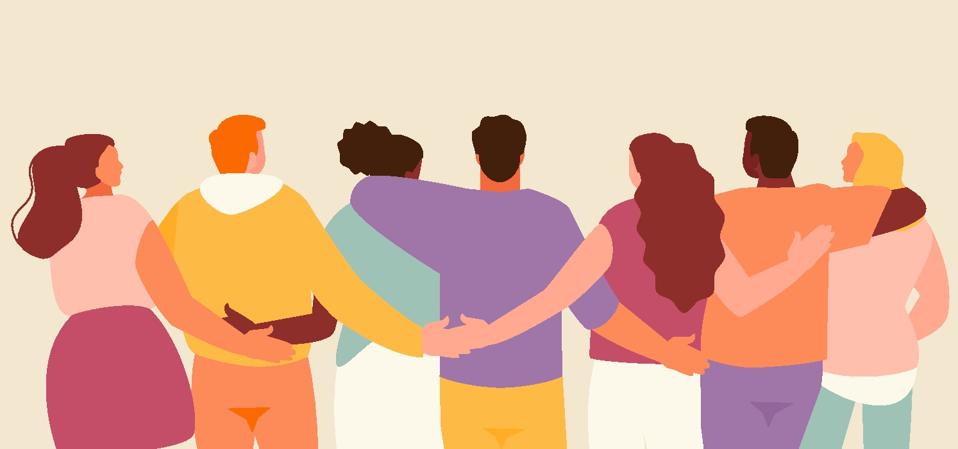Making friends as an adult is a different ballgame, with new and more complex rules. Here are three small adjustments you can make to befriend other grown-ups confidently.
getty
Imagine that you show up to a coworker’s birthday dinner or a new book club hoping for the easy flow of connection you once had as a child, and instead you leave with polite small talk and a vague feeling of awkwardness.
In school, friendship was a side effect of proximity and repetition: you sat next to someone in math class, traded snacks and one day realized they were “your person.” In adulthood, the equation gets messier due to a number of variables.
People’s lives are crowded with obligations, family, partners and long-standing circles that are difficult to enter. Even when you meet someone you like, it can feel like trying to merge into a traffic lane that’s already moving at full speed. The serendipity of friendship becomes rarer, and with it, the confidence that you’ll ever find “your people” again.
But this doesn’t necessarily mean that friendship in adulthood is broken. It just means that the old rules may not apply. And once you understand that, you can stop waiting for chemistry to strike and instead learn how to build connections with intention. Here are three evidence-backed shifts to make the process a lot easier.
1. Don’t Expect The ‘Click’ On Day One
As kids, we “clicked” with people almost accidentally. We didn’t analyze if someone would fit our personality or values; we simply continued to show up to the same playground. Those early bonds were principally created through routine, not immediate chemistry.
Yet as adults, many of us chase that spark, expecting to feel close after a single coffee or dinner. When we don’t, we silently conclude, “Maybe they’re not my kind of person.”
That mindset, though common, can sabotage adult connection. Research also suggests that people who believe that friendship depends on effort, and not luck or destiny, are far more socially engaged and less lonely. Those who believe friendship “just happens” tend to be lonelier.
So, believing you have to work at friendship is a psychological advantage. It keeps you open long enough for connection to form.
The reality is that most adult friendships grow slowly, through accumulated small moments, rather than cinematic instant bonds. A neighbor you exchange casual hellos with might become your closest friend in two years, but only if you allow the runway of friendship to be long.
You can stretch this runway by staying consistent even when the relationship still feels surface-level. Send a text after you meet, suggest a next get-together and remember small details about their life. Many of the most meaningful adult friendships begin with such quiet persistence.
So, the next time you don’t feel the “click” with someone, try replacing that thought with “Maybe it’s too early to know.” Friendship needs time to reveal its potential.
2. Lean On Schedules
The healthiest adult friendships usually benefit more from structure than spontaneity. As unexciting as it may sound, scheduling your friendships is one of the most thoughtful things one can do.
When we were young, common spaces like classes, lunchtimes and dormitories made friendship easy. You didn’t need to schedule it; it was just a part of your routine. But adulthood can pull you in different orbits. If you depend on happenstance, months can pass between sparse texting.
In a large systematic review published in Frontiers in Psychology in 2023, two friendship variables predicted the well-being of people most consistently over time:
- Friendship quality, or how positively your friendships feel
- Socialization frequency, or how frequently you get together
Turns out, it wasn’t the number of friends, but the intensity and frequency of contact that were most important.
And that’s why approaching friendship as something that is worthy of planning around, not just “worked in,” can deepen your platonic bonds. Think of it social maintenance. Send regular invitations for Sunday morning strolls, monthly meals or video calls for long-distance friends.
If money or time is limited, you can consider options like host rotation. It makes it predictable enough that it doesn’t fall on the last minute, which protects your friendship from competing priorities.
3. Make Room For Other People’s Lives
By the time we reach adulthood, most of us have solidified who we are and how we live. We choose partners, jobs, routines and values that define our identity. But that same stability can become a barrier to friendship, because the people we meet may be living in entirely different worlds. One friend’s life revolves around childcare; another’s around work, travel or creative projects.
To sustain friendships across such differences, we have to learn the art of accommodation. A friendship thrives when both people make small, mutual adjustments to honor each other’s realities.
Sometimes, that means meeting a friend for coffee near their office instead of insisting on your favorite spot. It could mean offering to babysit their kids so they can have an evening out or choosing non-alcoholic drinks when someone is practicing sobriety.
Sure, it may feel inconvenient at first, but you might realize later that it’s a small price to pay for maintaining a relationship that enriches and adds meaning to your life.
Why Adult Friendships Are A Different League
Childhood friendships were easy because, in so many ways, life was easier. You shared the same context and calendar. But adult friendships, when done right, can be even richer. They are chosen connections, and often even more conscious and deliberate.
A grown-up friend might not have the carefree enthusiasm of a classmate who saw you every day, but they bring something deeper to the table: perspective. The divorced friend who helps you navigate your first heartbreak. The overworked friend who still remembers to check in when you’re struggling. The quiet reliability of someone who gives you both space and support when you need it.
What makes adult friendship powerful is that it persists despite life’s chaos. You have more to juggle, more to lose, and more to protect, and yet, you still choose each other. That act of choosing, again and again, is what gives these bonds their weight.
Is your loneliness affecting your overall mental well-being? Take the science-backed WHO Well-Being Index to know where you stand.








